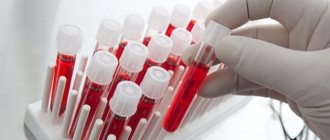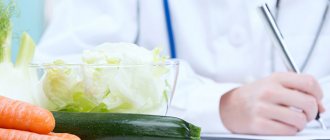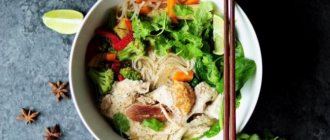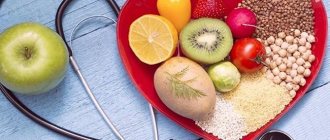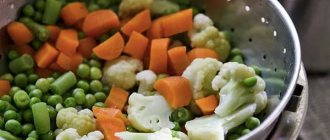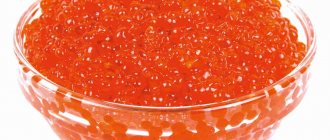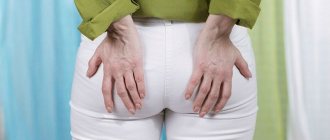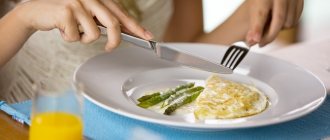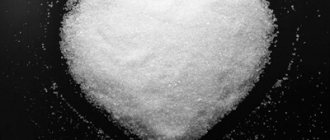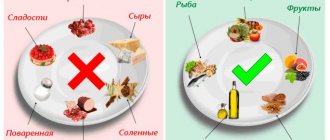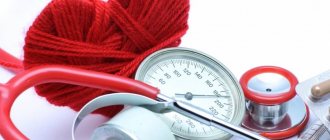- Causes
- Manifestations
- Prevention
- Conservative treatment of hemorrhoids
- Diet for hemorrhoids
- What can you eat if you have hemorrhoids?
- Dishes to prevent constipation
- Side dishes, appetizers, main courses
- Vegetables and fruits, sweets
- Beverages
- What foods should you not eat if you have hemorrhoids?
Hemorrhoids are inflammation of vascular formations in the anus, which are called hemorrhoids. The prevalence of the disease is quite high. According to statistics, up to 15% of the adult population suffers from it. In this article you will learn what hemorrhoids are, what factors provoke their development, what the diet should be for people with such a diagnosis and what foods should be avoided.
Causes
The disease occurs due to varicose veins of the anus. Proctologists treat hemorrhoids. Among the main causes of the pathology are improper diet, indigestion and frequent constipation, genetic predisposition, and numerous pregnancies in women.
People who spend a lot of time sitting are at risk of developing hemorrhoids. The same applies to those who engage in strength sports and work that involves lifting weights. Hemorrhoids in teenagers are not as common as in adults. The reason for the development of pathology at a young age is a tendency to varicose veins, chronic constipation, damage to the vessels of the anus.
Beneficial effects
Constipation also occurs with various functional disorders of the intestines, usually accompanied by increased gas formation. If a person begins to eat in accordance with the recommendations, the symptoms of flatulence (bloating, uncontrolled release of gas, feeling of heaviness, belching) are relieved.
Diet for anal fissure has the following beneficial effects:
- Reduces pressure in the anus;
- Eliminates symptoms of flatulence;
- Helps relieve hypersensitivity of the mucous membrane;
- Improves the consistency of stool;
- Normalizes intestinal peristaltic movement;
- Improves the general condition of the body;
- With long-term adherence to a dietary diet, it helps to reduce body weight.
Manifestations
With hemorrhoids, the external and internal hemorrhoids become inflamed. This leads to burning, itching and pain in the affected area. Many patients complain of a sensation of a foreign body in the rectum.
Discomfort increases with bowel movements, physical labor and prolonged sitting. If the external venous node is affected, the patient may see negative changes during self-examination. A sign of the disease is a burgundy-bluish swelling, similar to a lump. The knot becomes dense to the touch, and touching causes pain.
If, when signs of pathology appear, a person does not consult a proctologist, chronic hemorrhoids develop. It is dangerous due to exacerbations. With them, hemorrhoids fall out, complications arise in the form of thrombosis and regular bleeding.
The symptoms of internal and external hemorrhoids coincide with other diseases of the rectum. If alarming symptoms occur, you should make an appointment with a proctologist. The patient is prescribed an examination to confirm the diagnosis and adequate treatment is selected.
Uninterrupted bowel function. The essence of the products consumed
Daily consumption of fiber, which is contained in sufficient quantities in various foods: fruits, vegetables, bran. Fiber provides a number of vital functions:
- softens stool, ensuring painless bowel movements;
- removes waste and toxins from the body, preventing its contamination;
- ensures the maintenance of normal cholesterol levels;
- nourishes the intestinal microflora, without which the full functioning of the intestine is impossible.
Drinking significant amounts of water
If there is a lack of fluid in the body, the stool is excessively dense, it is difficult for the body to remove it, and as a result, problems arise. Prolonged stay of feces in the intestines contributes to their compaction, which makes it much more difficult to ensure their removal. Pressure on the walls causes the formation of hemorrhoidal fissures and nodes.
Prevention
Experts emphasize the importance of preventing inflammation of hemorrhoids. Here is a list of recommendations given by proctologists:
- Avoid inactivity, which causes blood to pool in the pelvic area.
- Stop smoking and minimize alcohol consumption.
- If you are prone to constipation, it is necessary to identify and eliminate their cause and normalize your diet.
- Avoid situations that can lead to damage to blood vessels and the appearance of cracks in the anal mucosa.
Effective treatment
To eliminate bleeding, the doctor may prescribe anti-inflammatory suppositories with adrenaline for rectal use.
To strengthen blood vessels, improve blood circulation in the nodes and increase capillary tone, he will definitely recommend a phlebotropic drug. For example, detralex, venoruton, venarus.
To normalize bowel movements and digestion, drugs are used: mucofalk, laminarid, duphalac, etc.
| Heavy bleeding | Suppositories with adrenaline, hemostatic drugs: adroxon, tachocomb or spongostan, dicinone, sodium etamisylate, aminocaproic acid. |
| For conservative treatment | Phlebotonic drugs Detralex, Phlebodia600, Venarus, Glivenon, Venoruton. |
| Pain syndrome | Non-narcotic analgesics: analgin, baralgin, painkillers in the form of gels, ointments and suppositories: nefluan, aurobin, ultraproct, posterizan-forte, proctoglivenol, posterisan, etc. |
| Prolonged bleeding | Sclerotherapy (injection with the drug) is used into the affected nodes. |
If there are traces of thrombosis on the hemorrhoids, direct anticoagulants are used.
Doctor's supervision is important! Even after successful treatment and bleeding cessation, you should see a doctor. The specialist will indicate further recommendations and adjust the diet.
THERE ARE CONTRAINDICATIONS CONSULTATION WITH YOUR DOCTOR IS REQUIRED
Author of the article Alexey Alexandrovich Egorov, proctologist
Write your opinion
Diet for hemorrhoids
Successful treatment of hemorrhoids can only be achieved if the patient is ready to change his lifestyle and follow the doctor’s recommendations. An important part of therapy for inflammation of hemorrhoids is the correct diet. The strongest restrictions are necessary during the period of exacerbation of the disease.
For inflamed hemorrhoids, you should carefully choose foods and methods of preparing them.
Here are the basic principles for constructing a menu for hemorrhoids:
- Dishes that lead to constipation and diarrhea should be excluded from your diet. The same applies to products that irritate the intestinal mucosa.
- The patient's daily menu should include vegetables, berries and fruits. The exceptions are varieties that are too sour and sweet, as well as those that strengthen the stool (unripe bananas and pears, persimmons, chokeberries). Fruits and vegetables are consumed fresh, stewed and boiled. Fermented milk products with live bacteria, viscous porridges, dishes with added bran, and unrefined vegetable oil are beneficial for digestion. Such food nourishes the body and stimulates the digestive process, and has a positive effect on intestinal motility. Plant-based foods high in fiber help prevent constipation.
- When building a menu, it is necessary to reduce the amount or completely abandon marinades and sauces with a high content of fat, salt and spices, smoked meat and fish, and baked goods made from wheat flour.
When diagnosed with hemorrhoids, split meals are optimal. It is advisable to eat 5-6 times a day in small portions. Food should not be very hot or cold. Food should be chewed thoroughly, so do not eat in a hurry.
Please note: when constructing a diet, it is necessary to take into account your overall health. For example, bran and foods high in coarse fiber can be harmful in diseases of the stomach and duodenum. If a patient is diagnosed with gallstone disease, the consumption of unrefined vegetable oil should be reduced.
Nutrition after surgery
What to eat after hemorrhoid surgery? Medical nutrition is one of the main components of rehabilitation. According to the Clinical Guidelines of the Russian Association of Coloproctologists for the diagnosis and treatment of hemorrhoids, the menu after hemorrhoids may include foods rich in fiber. This includes wheat bran, seaweed, and flaxseed. It is also possible to prescribe nutritional supplements that soften the stool and help with regular bowel movements.
After surgery, bleeding may occur for several weeks. The diet for hemorrhoids with bleeding should be strictly followed.
Dishes to prevent constipation
If hemorrhoids are inflamed, you should add oatmeal and pearl barley to your diet. They contain a lot of fiber and are useful for people prone to constipation. You can make crumbly and viscous porridges from oatmeal, and pearl barley can be added to soups and side dishes. To improve intestinal motility, dried prunes, dried apricots, and other dried fruits can be added to oatmeal dishes. Pearl barley porridge is consumed with fresh vegetables and vegetable oil.
To prevent constipation, first courses should be included in the diet. Vegetable soups are the most beneficial for digestion. Too fatty and rich meat broths should be avoided.
Example of a daily diet
The daily diet for men and women is slightly different. Below are examples of daily menus.
For men
Breakfast: chicory, 2 soft-boiled eggs, buckwheat.
Lunch: salad with tomatoes and mozzarella, boiled potatoes with butter and herbs.
Lunch: pumpkin soup with cream, rice porridge with stewed turkey, tea.
Afternoon snack: cottage cheese casserole with raisins.
Dinner: fish meatballs, stew, compote.
Late dinner: ryazhenka.
Sample menu for men.
For women
Breakfast: oatmeal, yogurt, fruit salad.
Lunch: pumpkin porridge with milk.
Lunch: carrot soup, fish stewed with vegetables, buckwheat porridge, herbal tea.
Afternoon snack: cottage cheese casserole, compote.
Dinner: stew, chicken cutlets, a few slices of bread.
Late dinner: homemade yogurt.
Possible menu for women.
Side dishes, appetizers, main courses
Pasta and potatoes can be eaten in limited quantities. The same applies to any products with a high starch content, which enhances the fermentation process. It is advisable to eat the usual side dish of mashed potatoes with fresh or stewed vegetables. It is worth giving up pasta made from premium flour and flour sweets with cream.
As a source of animal protein, in addition to dairy products, lean meat, fish and seafood are recommended.
Cheese for hemorrhoids should be consumed with caution. Hard cheese contains a lot of fat, casein and lactose. This product strengthens the stool, which is unacceptable for constipation. Safer are soft curd varieties and brine cheeses: feta cheese, feta and suluguni. Unlike hard cheese, they have a mild laxative effect.
Eggs can be eaten soft-boiled.
General Tips
- To prevent constipation, you should eat protein foods (meat, fish, eggs, cottage cheese) in moderation.
- If you have frequent diarrhea, before changing your diet, you need to find out the cause.
- In case of gas formation, you need to remove legumes, white cabbage, and rye bread from your diet.
- Outside of an exacerbation, a small amount of low-alcohol drinks is allowed: cider, wine, cocktails.
- For constipation, instead of laxatives, it is recommended to eat dried apricots and prunes.
- You can add cilantro, dill, basil, and parsley to ready-made dishes.
Vegetables and fruits, sweets
If you have hemorrhoids, you should include peaches, apples, plums, melons and watermelons in your diet. Experts advise eating juicy fruits to prevent constipation. Fruits that are not ripe enough or that are too sour should be avoided. Such food can lead to stool upset, and diarrhea aggravates hemorrhoids due to irritation of the mucous membrane. Overripe fruits are undesirable, as they contribute to the fermentation process and cause flatulence.
Dried fruits are good for digestion, and nuts and seeds enrich the body with vegetable protein. Sweets allowed are honey, jam, marshmallows, marshmallows, and dry cookies. Sweets are consumed in small quantities, since simple carbohydrates lead to fermentation.
Alcohol
If you have hemorrhoids, alcoholic drinks are prohibited. They thicken the blood, dilate veins, draw fluid from the intestines and promote swelling of soft tissues. When they are consumed in large quantities, there are frequent exacerbations of the disease, it progresses, new nodes appear, and old ones increase in size.
Alcoholic beverages are not allowed to be consumed in any form or stage of hemorrhoids.
